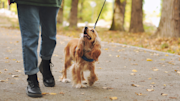Pets and children: ideas to create a safe and happy home for everyone

Cocker Spaniel pet insurance
Discover why Cocker Spaniels make great pets and why pet insurance is a smart way to protect their health

Cocker Spaniel breed overview
Cocker Spaniels are friendly, medium-sized dogs that enjoy being around people. They were first used as hunting dogs but are now popular family pets. Cocker Spaniels need regular walks and grooming to stay healthy and feel their best.
Keep reading to learn more about the Cocker Spaniel breed and how Co-op Pet Insurance can help you care for your dog’s health and wellbeing.
Cocker Spaniel key facts
Lifespan
Cocker Spaniels typically live for 12 years or more.
Size and weight
They are medium-sized dogs, usually weighing between 13 and 16 kilograms.
Coat and colour
They have silky, medium-length coats that come in a variety of colours, including black, golden, and dark brown.
Exercise needs
They enjoy active play and daily walks, and need moderate to high levels of exercise.
Shedding and grooming
They shed moderately and benefit from regular brushing to keep their coat healthy.
Temperament
They are gentle, affectionate, and eager to please, making them great family pets.
Learn more about Cocker Spaniels

They're gentle and affectionate
Cocker Spaniels are sweet-natured dogs who love being close to their people. They’re great with children and enjoy being part of family life. They can be sensitive, so gentle training works best.

They love to explore
These dogs are playful and curious. They enjoy walks, games, and exploring new places. Regular activity helps keep them fit and prevents boredom.

They need regular grooming
Cocker Spaniels have soft, wavy coats that need brushing several times a week. They’re also prone to ear infections, so regular cleaning is important. Pet insurance can help with the cost of treating common skin or ear issues.
Common health conditions in Cocker Spaniels
Cocker Spaniels can live long and happy lives, but they are prone to several health conditions. Here are six to be aware of:
Progressive retinal atrophy
Progressive retinal atrophy is a genetic eye condition that gradually leads to vision loss. It typically begins with night blindness and can progress to complete blindness over time.
Hip dysplasia
Hip dysplasia occurs when the hip joint doesn’t develop properly, leading to a loose or unstable fit. This can cause discomfort, reduced mobility, and difficulty with activities like walking or running.
Grass seed injuries
Dogs with long or fluffy fur can pick up sharp grass seeds, especially around their ears, eyes, nose, and paws. These seeds can pierce the skin and cause pain, swelling, or infection. Avoid long grass in summer and check your dog after walks. Pet insurance can help with unexpected vet costs.
Ear infections
Some dogs have ear shapes that make it harder for air to circulate, which can trap wax and moisture. This can lead to infections. Look out for head shaking, scratching, or a strong smell. Gentle cleaning and regular checks can help keep ears healthy.
Adult onset neuropathy
Adult onset neuropathy is a nerve disease that affects how dogs move. It usually starts when the dog is older. Dogs with adult onset neuropathy may stumble or have trouble walking. It’s passed down from parents, so testing is important.
Autoimmune hemolytic anemia
Autoimmune hemolytic anemia is a serious illness where the dog’s immune system attacks its own red blood cells. This causes weakness and tiredness. It needs quick treatment from a vet and can be life-threatening.
Care tips for owners
Brush their coat often
Their silky fur tangles easily. Brush several times a week.
Clean their ears
Long ears can trap moisture. Check and clean to prevent infections.
Exercise daily
Walks and playtime help keep them fit and mentally stimulated.
Watch for eye issues
Cocker Spaniels can develop eye problems. Look for redness or discharge.
Train gently
They’re sensitive and respond best to calm, positive training.
Visit the vet regularly
Routine vet visits help monitor ear, eye, and joint health.
Why do you need dog insurance?
Dog insurance is there to cover your dog if they have an accident or illness and will cover the costs of the treatment needed, minus any excesses.
Some of the key reasons to buy dog insurance are:
Cost of vet fees
Vet fees can cost thousands of pounds depending on the type of treatment and the size and breed of your pet.
Peace of mind
Knowing that you are covered for what can be a large unexpected bill.
Lifetime cover
If you choose a lifetime policy, any illnesses or accidents insured will continue to be covered for the whole of your pet's life.
Compare our cover types
Compare the difference between the two types of Co-op Dog Insurance.
|
Cover |
Lifetime |
Time limited |
|---|---|---|
Vet fee cover | up to £16,000 | up to £5,000 |
Lifetime cover for recurring illness
| Lifetime cover for recurring illness included | Lifetime cover for recurring illness excluded |
Dental treatment | Dental treatment included | Dental treatment included |
Third-party liability cover
| Third-party liability cover included | Third-party liability cover included |
Pay monthly at no extra cost | Pay monthly at no extra cost included | Pay monthly at no extra cost included |
Advertising and reward
| up to £2,500 | up to £1,000 |
Loss of pet
| up to £3,000 | up to £1,000 |
Lifetime
Vet fee cover
up to £16,000
Lifetime cover for recurring illness
for example if your pet is insured and you keep renewing, cancer treatment is covered for life
Dental treatment
Third-party liability cover
dogs only
Pay monthly at no extra cost
Advertising and reward
if your pet goes missing
up to £2,500
Loss of pet
due to theft or if they are lost
up to £3,000
Time limited
Vet fee cover
up to £5,000
Dental treatment
Third-party liability cover
dogs only
Pay monthly at no extra cost
Advertising and reward
if your pet goes missing
up to £1,000
Loss of pet
due to theft or if they are lost
up to £1,000
For more details on what is and isn't covered, read our policy documents.



